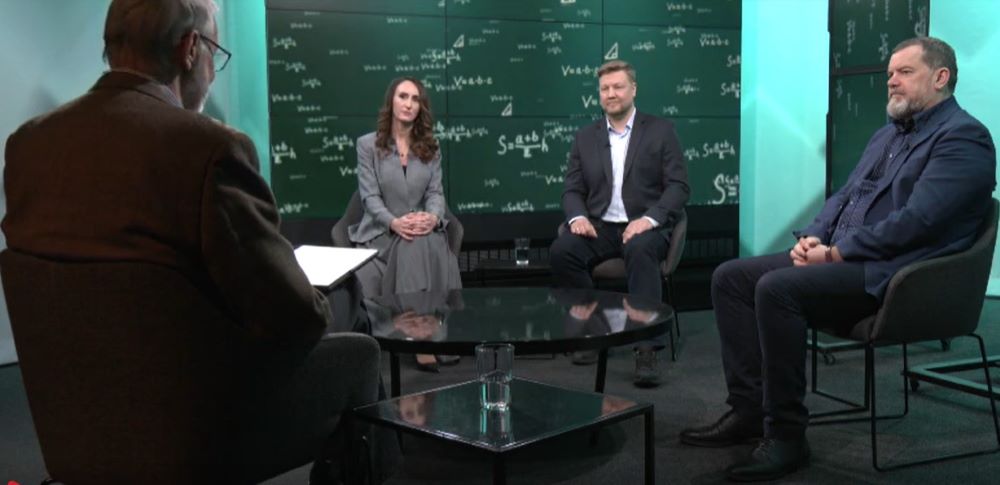“Latvijas formula”: we must do our homework for Latvia’s security
Source: jauns.lv
In the fourth episode of the discussion series Latvijas formula, experts from Latvia’s leading universities examined the country’s internal and external security landscape. The panel analysed global developments, evaluated the policies of US President Donald Trump, and explored what steps Europe and Latvia should take to strengthen their security frameworks.
- Part I of the episode
- Part II of the episode
Moderated by University of Latvia (LU) Prof. Mārcis Auziņš, the discussion featured guest lecturer and researcher Mārtiņš Štāls from the Latvia University of Life Sciences and Technologies (LBTU), lecturer Andis Kudors from UL and the Institute of Latvian History, and Assoc. Prof. Karina Palkova, Dean of the Faculty of Social Sciences at Rīga Stradiņš University (RSU).
Latvia’s geographic position — bordering one of the world’s most aggressive states with a military budget over 100 times larger than Latvia’s — makes its security particularly sensitive. While NATO and EU membership place Latvia within a broader and more powerful alliance, recent global shifts are challenging this traditional security structure. The US, NATO’s strongest member, appears to be moving toward global isolationism under Trump’s leadership, raising concerns about future commitments to allies.
While it's unlikely that Trump seeks to dismantle NATO outright, even the possibility of reduced US engagement forces smaller states like Latvia to consider alternative security strategies.
Does Latvia's future security depend on Trump's whims?
At the beginning of the discussion, Professor Mārcis Auziņš stressed that the global security situation is changing every day, and that it is mostly determined by the seemingly chaotic actions and statements of the US President and his administration. He encourages the participants to examine the role that Trump's personality plays in modern history. Assoc. Prof. Palkova stresses that
In the case of the US, it is more about the "collective Trump".
'Personality is undeniably important, but what we are seeing in the US is loud and threatening messages on the one hand, but there is another part of the President's team that is trying to soften all this and increase optimism. As a result of this "good cop/bad cop" routine, we see Europe being forced to actively address its own security issues - so the goal has been achieved.'
 Centre left: Dean of the RSU Faculty of Social Sciences Assoc. Prof. Karina Palkova. Screenshot
Centre left: Dean of the RSU Faculty of Social Sciences Assoc. Prof. Karina Palkova. Screenshot
LBTU researcher Mārtiņš Štāls believes that the new US presidential administration is primarily concerned with domestic problems and wants to make changes as soon as possible to reduce public spending, including by reducing the US presence in international conflicts. 'The US has a huge foreign debt, a negative trade balance and a demand from voters to change this situation, so Trump is rushing in while he still has the support of Congress, because soon he may not. I assume that they are prepared to "swallow the bitter pill" and shrink internationally in order to sort out internal affairs and then start from a new position.'
Andis Kudors, a lecturer at UL, stresses that Trump's arrival is a public reaction to the failure of the classic Democrats and Republicans to take important decisions. 'Unfortunately, we have to admit that the America in which justice was the most important word has been sidelined by Trump, including in foreign policy. Don't be fooled - the US has always had proponents of realpolitik, it didn't start now, but they have also always stood for justice and international law. The fact that these are no longer important is a fundamental change that Trump has introduced. As a small country, international law is important to us; it will be difficult to live in a world where everything is determined by who is bigger and stronger.'
NATO is not the only guarantor of security
Europe and Latvia are facing a "frog's dilemma" - to raise their legs and sink into a bucket of milk, or to churn the milk into butter and survive. Štāls reminds us that no document can protect a country if it does not protect itself. 'Ukraine was protected by the Budapest Memorandum, which described and signed strict security guarantees. How did it end? Latvia should also not rely on Article 5, but build closer cooperation with the Baltic and Nordic countries, both NATO and non-NATO members. Joint exercises, military production and other forms of cooperation should be developed. It is we who understand each other best and are most interested in working together.'
Karina Palkova stresses that everyone has the right to live, including countries and peoples, but we should not hope that someone else will make sure that we have this right.
'If we as citizens, as a country or as the European Union are not doing our duty, if we are not taking care of our own security, why should anyone else? If each Member State does its homework, it will be easier for all of us to reach a common result.'
Andis Kudors believes that NATO should not be seen as a completed phase. "I am sceptical about the idea of a European army. I think we should not give up on NATO. All military cooperation, command centres, logistics - everything is based on NATO models. What we should definitely think about is closer cooperation between the Baltic Sea countries, which do not need to be told what Russia is, because they know it from their own history."
We will only be as strong as our investment in security
The panellists agree that spending on security must be increased. Štāls believes that we need to stop flitting between different priorities and focus on what is most important. 'The government needs to clearly state that we will increase spending on defence and other areas will have to suffer. We cannot stretch the budget blanket endlessly in all directions.'
Kudors agrees: 'We have to accept that we live next to a barbaric revanchist state with imperial tendencies. We cannot relax - we have to be strong militarily, and we will have to spend a lot of money to do it.'
Assoc. Prof. Palkova also stresses the internal security aspects: 'We need to think about the security of the information space, about cyber-security, about the need for universities to train specialists who can fight disinformation, about the readiness of the police and other internal affairs bodies for all kinds of situations.'
Related news
 RSU researchers explain how digital technologies help paediatric oncology patientsRSU in the news, Consolidation, Research
RSU researchers explain how digital technologies help paediatric oncology patientsRSU in the news, Consolidation, Research


